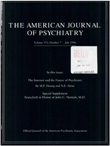Panic disorder in patients attending a clinic for vestibular disorders
Abstract
In a study of the prevalence of panic and other anxiety disorders in persons with complaints of dizziness, 87 patients referred to a clinic for vestibular disorders completed self-rating measures of anxiety and depression; 32 also underwent a structured diagnostic interview. Thirteen (14.9%) of the patients met the DSM-III-R criteria for panic disorder, agoraphobia, or both. They rated themselves as much more disabled by their dizziness than the patients with no psychiatric disorder. Panic disorder was equally prevalent among patients with and without vestibular disease. In some cases panic disorder may provide an explanation for the dizziness, whereas in others it may be a comorbid condition compounding the disability attributable to the vestibular disorder.
Access content
To read the fulltext, please use one of the options below to sign in or purchase access.- Personal login
- Institutional Login
- Sign in via OpenAthens
- Register for access
-
Please login/register if you wish to pair your device and check access availability.
Not a subscriber?
PsychiatryOnline subscription options offer access to the DSM-5 library, books, journals, CME, and patient resources. This all-in-one virtual library provides psychiatrists and mental health professionals with key resources for diagnosis, treatment, research, and professional development.
Need more help? PsychiatryOnline Customer Service may be reached by emailing [email protected] or by calling 800-368-5777 (in the U.S.) or 703-907-7322 (outside the U.S.).



